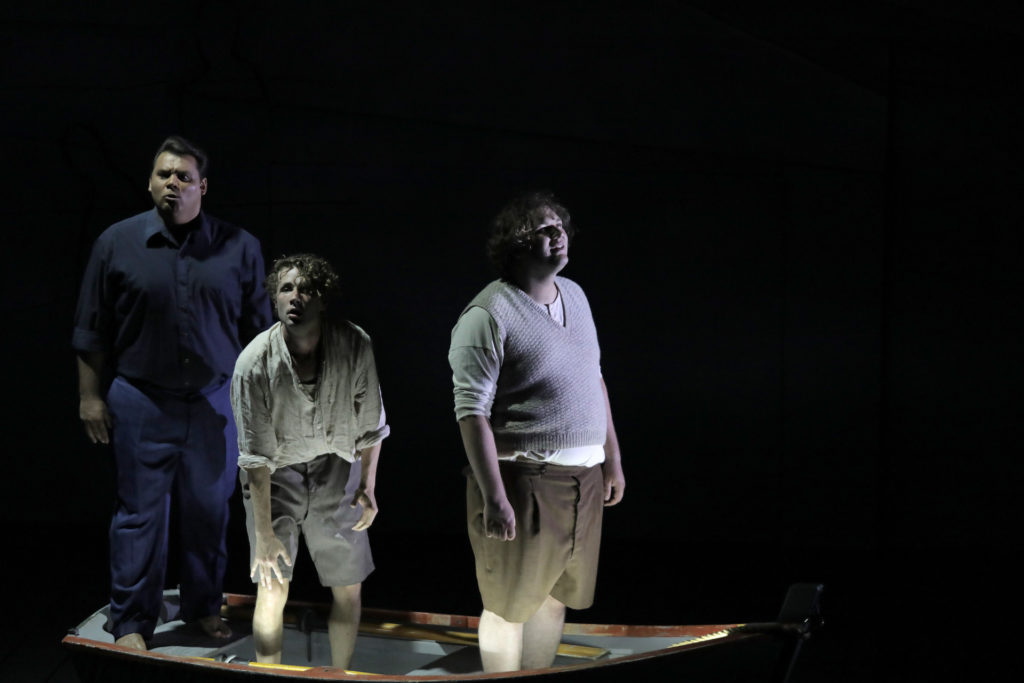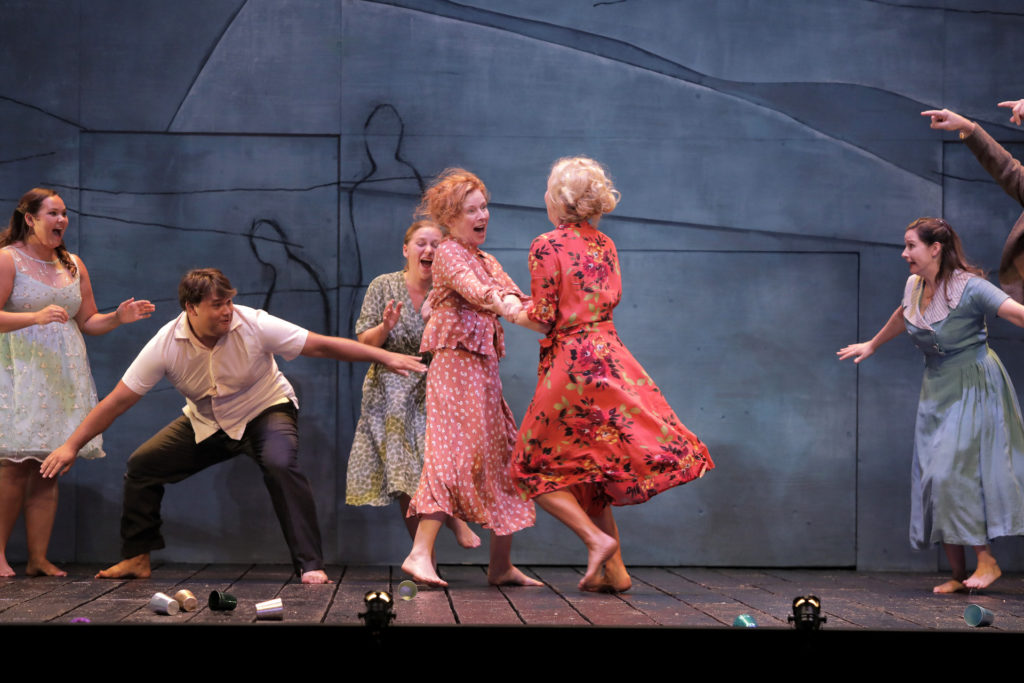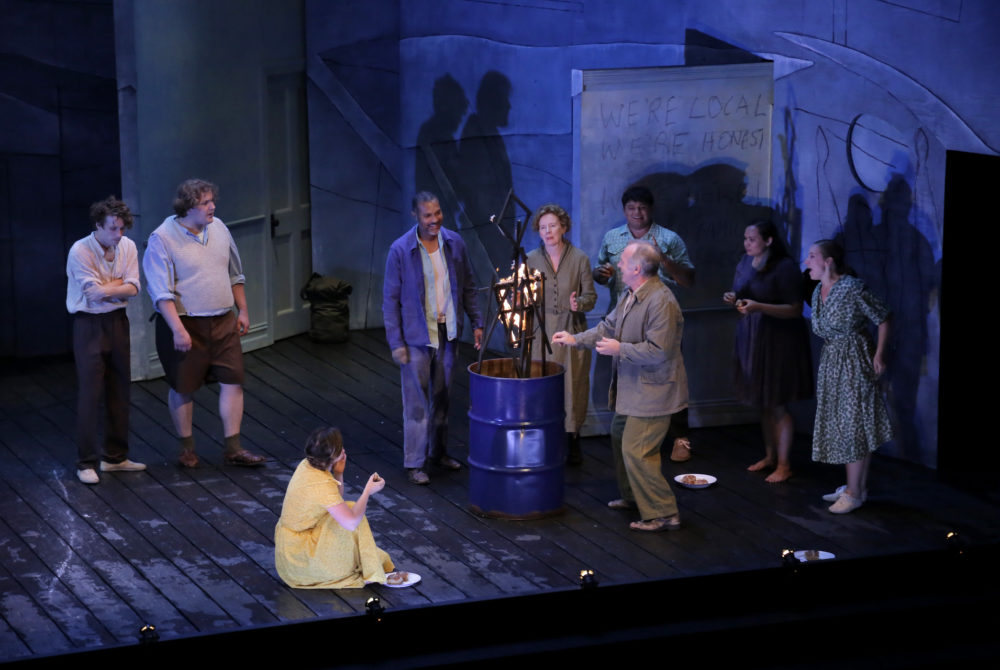It takes hours to unfold, but Jan Hallam says ‘the big baggy story’ of Cloudstreet is well worth revisiting.
A tangled tale told well
23 February 2020
- Reading time • 7 minutesPerth Festival
More like this
- This Angel soars, even on one wing
- Power of language written on the walls
- Oh! What an extraordinary experience
Review: Black Swan State Theatre Company, Malthouse Theatre, Cloudstreet ·
His Majesty’s Theatre, 22 February 2020·
Review by Jan Hallam ·
Tim Winton – author of one of the nation’s most beloved and intriguing novels of the 20th century – writes in the program (playfully presented as a four-page newspaper) of this signature Perth Festival show: “Cloudstreet is a big, baggy story and finding ways to bring it to life on stage was no simple business 20 years ago, and it can’t have gotten any easier since …”
The “baggy” story throws up the same questions about identity, family, marriage, nostalgia and colonialism it always has. Do we, in 2020, have any different answers?
It’s a rare privilege to be of an age where there are genuine touchstones to a text that starts post-war and concludes in the early 1960s, and is set where you have always lived. How special, then, that the story speaks of specifics of that place (all the better if they happen to be universal), and the values of those populating it; of understanding the relentless efforts of people living there, to watch them fail, succeed, survive; to adjudicate their insights and growth, or their wilful ignorance and prejudice.

How many people, hearing the teenaged Rose (Brenna Harding) opining that she wanted to be anywhere but here, hadn’t said or thought those words a million times? The cringe of the place, the unbridled joy of it. The seething tangle of contradiction of life in the Western third; the emotional tangle of Cloudstreet.
So brave, brave Black Swan and Malthouse for going around again, and kudos to Malthouse artistic director Matthew Lutton, who built bridges over many stretches of treacherous cultural waters, bringing an edgier framework to the play, reflecting the uncertain times in which we live.
There is a sense of chaos, anger and violence hovering around the edges – a malevolence greater than the much-discussed serial murders perpetrated by Eric Edgar Cooke. This character stalks the stage at random intervals with the inevitable loud crack of a shotgun testifying to another woman down. Was this when Perth lost its innocence? Who are people kidding? When has life – and life in this place – ever been innocent? Lutton intuits this and imbues an uneasiness, even in laughter.

Bear testament as lovely Lester Lamb (Greg Stone) – a gorgeous gentle bloke – violently “takes” his drunk neighbour, Dolly (Natasha Herbert), on her kitchen table. On her part, there’s her cruel disappointment in herself, reflected in her abominable treatment of her husband and daughter. Then there’s the ferocity of Oriel Lamb (Alison Whyte) as she loses precious control over her life and her children’s; and Sam Pickles’ (Bert LaBonte) wanton demolition of his family simply because responsibility is a shirt he doesn’t want to wear.
This quartet of actors is beautifully in sync, creating such natural performances you could be dropping into Nan’s for a cup of tea; so real, you cry for them… and for us.
Landscape and place are intrinsic to the story, and how to take Winton’s sweeping depictions is an enormous challenge within the confines of a proscenium stage. Lutton and designer Zoe Atkinson’s vision for the broiling cauldron that is No.1 Cloud Street is rendered with moving walls, dividing and uniting the two fractured families at critical moments in the play.
Significantly, the younger Lambs and Pickles spend much of their time trying to get out of Cloud Street. Rose goes in search of emotional and financial independence from her parents, picking up a job on a department store switchboard and flirting with western suburb pseudo-intellectuals – open stage. Quick (Keegan Joyce) heads to the wide open spaces of the bush, among the roos and wheatfields – contracted to a symbolic small window. And then there’s Fish (Benjamin Oakes), who left a significant portion of himself underwater when he was trapped in a prawning net as a kid. His relentless quest to be whole and return to the water, leaving behind a life represented by a floundering blowie on the jetty, is spiritually portrayed by Paul Jackson’s watery, serene lighting.

All these creatives, with a flick of a switch, change benevolence or malevolence – with a crashing wall, a sharp cut to black (punctuated by J. David Franzke’s sound design) or the awful fracture of a gunshot off stage. Their work is central not only to how characters do what they do, but also to the very essence of why they do it.
So, in this very baggy review of a baggy story, did I like it? Was the time it took to unfold (five hours and 20 minutes, with a couple of nice breaks) worth it?
I was shocked, dismayed, amused and heartbroken by it. Was it worth it? Absolutely.
Cloudstreet is on at His Majesty’s Theatre until 15 March 2020.
Pictured top: The cast of ‘Cloudstreet’, a co-production of Black Swan State Theatre Company and Malthouse Theatre. Photo: Philip Gostelow
Like what you're reading? Support Seesaw.







